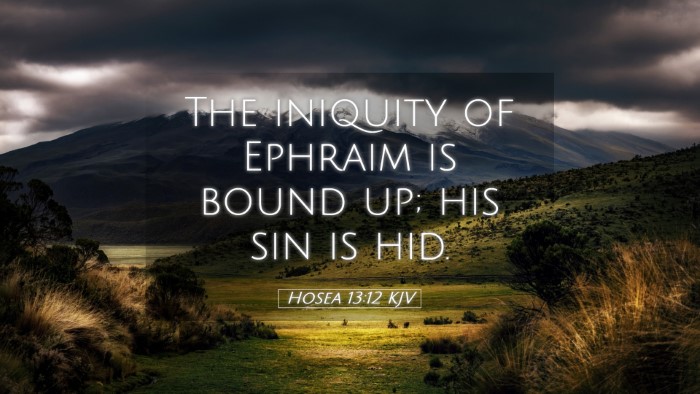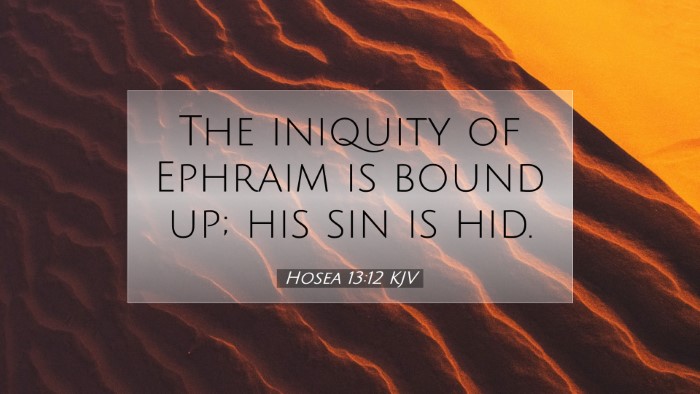Old Testament
Genesis Exodus Leviticus Numbers Deuteronomy Joshua Judges Ruth 1 Samuel 2 Samuel 1 Kings 2 Kings 1 Chronicles 2 Chronicles Ezra Nehemiah Esther Job Psalms Proverbs Ecclesiastes Song of Solomon Isaiah Jeremiah Lamentations Ezekiel Daniel Hosea Joel Amos Obadiah Jonah Micah Nahum Habakkuk Zephaniah Haggai Zechariah MalachiHosea 13:12
Hosea 13:12 KJV
The iniquity of Ephraim is bound up; his sin is hid.
Hosea 13:12 Bible Commentary
Bible Commentary on Hosea 13:12
Verse Overview: Hosea 13:12 states, "The iniquity of Ephraim is bound up; his sin is stored up." This verse serves as a poignant reminder of the consequences of sin, illustrating the depth of Israel's moral and spiritual decay.
Historical Context
The prophecy of Hosea takes place during a tumultuous period in the history of Israel, characterized by political instability and spiritual apostasy. Ephraim, a significant tribe, symbolizes the northern kingdom of Israel. The prophet's message highlights God's judgement and the impending consequences of the nation's continued disobedience.
Commentary Insights
Matthew Henry's Commentary
Matthew Henry emphasizes the seriousness of Israel's sin and the idea of iniquity being "bound up." He suggests that, in a metaphorical sense, the sins of Ephraim are tightly intertwined, indicating a cumulative effect of transgressions that cannot be easily separated. Henry asserts that these accumulated iniquities will lead to inevitable judgement.
- The Binding of Iniquities: The phrase suggests a form of enslavement to sin, where the nation is not only guilty of individual acts but is caught in a web of collective iniquity.
- Consequences of Sin: Henry argues that the storing up of sin implies that God's patience has limits and that a time of reckoning is at hand.
- Call to Repentance: This exposition serves as a call to recognize the weight of sin and the necessity of returning to God to avoid dire consequences.
Albert Barnes' Notes on the Bible
Albert Barnes provides a thorough analysis of the terms used in this verse, explaining that the metaphor of iniquity being "bound up" indicates a state of readiness for judgement. He connects this concept to the idea of treasure being stored; in this case, the "treasure" is the accumulated sins of Ephraim, now ready to be dealt with by divine justice.
- Storing Up of Sin: Barnes posits that this storage is not merely a passive act; it reflects a historical pattern of rebellion against God's covenant.
- Judgement Imminent: He conveys that the verse communicates an urgency for the people of Ephraim, as their sins are not forgotten but are instead awaiting divinely appointed judgement.
- God’s Justice and Mercy: Barnes reminds the readers that even in judgement, God's ultimate goal is the redemption and restoration of His people through repentance.
Adam Clarke's Commentary
Adam Clarke expands on the implications of sin being "bound up," focusing on the psychological and spiritual captivity that sin imposes on individuals and communities. Clarke discusses how sin, when unrepented, leads to a hardened heart and a calloused spirit.
- Spiritual Blindness: According to Clarke, the inability to see one's own iniquity results in a deep spiritual malaise, making the nation more susceptible to further transgressions.
- Hope Amidst Judgement: Clarke underscores that while the verse reflects a severe warning, there is always hope for restoration through humility and turning back to God.
- God's Longsuffering: He highlights God’s patience but warns that such mercy should not lead to complacency; rather, it should inspire a sincere response to God's call for righteousness.
Theological Implications
This verse invites deeper theological reflection on the nature of sin, judgement, and grace. The binding of iniquity signifies the reality that sin can compound and create barriers between humanity and God. It serves as a cautionary tale that is relevant today in a contemporary context where corporate sin can lead communities away from righteousness.
- Understanding Corporate Sin: The idea of iniquity being bound up invites Christians to consider how collective actions can impact a community's standing before God.
- The Need for Confession and Repentance: The verse highlights the importance of not only personal repentance but also corporate acknowledgment of sin.
- Divine Justice and Mercy: This passage illustrates the balance between God's justice and mercy, a key theme that runs throughout Scripture, encouraging believers to hold fast to hope in God’s redemptive plan.
Conclusion
Hosea 13:12 serves as a powerful reminder of the seriousness of sin and the necessity of acknowledging our iniquities before God. Drawing from the insights of prominent biblical commentators, we understand that while judgement is imminent due to the stored sins of Ephraim, God's ultimate desire is for His people to return to Him. This comprehensive understanding should encourage pastors, theologians, and students alike as they seek to grapple with the implications of sin and the call to spiritual renewal.


